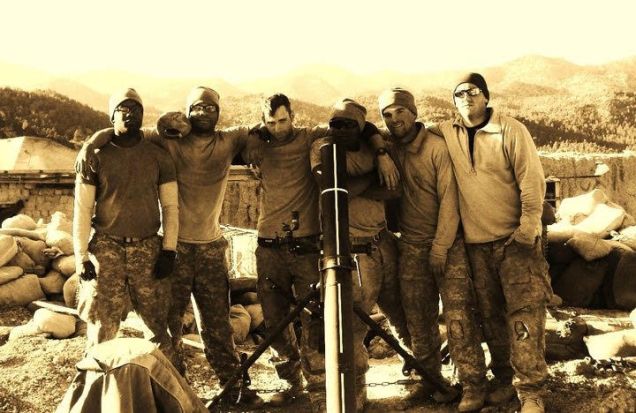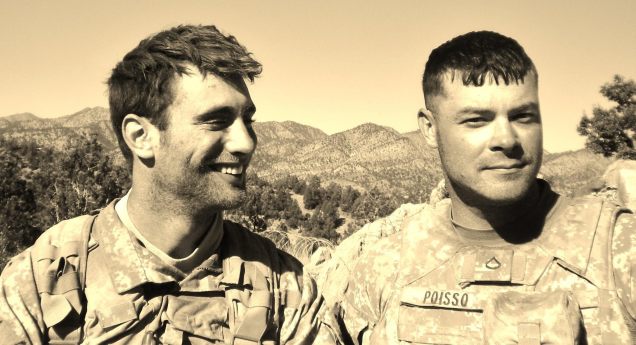Alex Masteller was born in 1988. Alex was home-schooled by his parents along with his two older brothers here in Marion, Ohio. Alex spent his extra curricular time enjoying graphite sketching, skateboarding and playing drums and piano. Masteller states that he did not know in what direction he was going to take with his career opportunities. He was working in the lawn care business, but knew he wanted to pursue other options. He had no interest in college at the time. With enlistment in the Army always in the back of his mind, since he and his family made a visit to Washington, D. C. They had visited Arlington National Cemetery and the “Changing of the Guard” at the Tomb of the Unknowns. Alex said, “It scared me at first. Baritone commands being shouted and violently swift but crisp movements. That was the first time I caught a glimpse at a soldier. It stuck with me throughout my life. I find it ironic that drill and ceremony was my least favorite activity in the service.”
In 2008 Alex joined the United States Army receiving his basic training at Sand Hill, Ft. Benning, GA.
Masteller became an 11C – Indirect Fire Infantryman (Mortarman).

Alex Masteller served his time with 1/33 Cavalry Regiment, 3rd BCT, 101st ABN DIV. Masteller was deployed to Afghanistan and serving at an outpost. He attained the rank of Sergeant. Sgt. Masteller would not always have access to the internet to keep in contact with family. He got to make phone calls, but said that the lack of the internet actually allowed him to not be distracted by the outside world and let him focus on the mission and those he would be leading. Sgt. Masteller still wrote letters to family back home. With only one phone available he said he would trade his phone cards to the married guys, so that they could have calls with their wives and family. And this also would get him to trade off of some of his guard duty. When he did get more access to the internet he used e-mail and social media to keep in touch with family and friends.

While assigned at an outpost on the side of a mountain Sgt. Masteller said his free time was spent lifting weights and playing cards. Sgt. Masteller said, “We had a few Ohio boys and some other mid westerners so lots of euchre for sure. We would box to settle disputes and for fun, but there was always something to fix at that place. Filling sandbags, reinforcing walls, rebuilding guard towers, etc.”

When asked if he ran into anyone from Marion, Ohio while deployed Sgt. Masteller said that he didn’t see him in person, but talked with Thomas LaHut. LaHut had enlisted after Masteller, but into the Air Force. He said while LaHut was stationed at Bagram Airfield, the airman was involved with loading aircraft with munitions.
Sgt. Masteller said, “We called in for a couple 500lb. bombs to be dropped on insurgents; a long firefight at the end of a 3 day OP in the mountains. Anyway, he was the one who loaded the bombs. Thought that was pretty cool.”

Masteller’s time in Afghanistan, 2010-2011, was spent at Forward Operating Base (FOB) Clark in the Khost province for a couple months. But most of his time was spent at combat outpost (COP) Spera. COP Spera was still in Khost province but further south, bordering Pakistan about a klick to our east and Paktika not far South.
Spera was a small outpost in the mountains. Consisting of mud huts, Hesco barriers, sand bags, and shotty carpentry work at best. It was close quarters living, no plumbing, and run on generators. Not including the lower qalat (mud brick compound or mud huts) which housed the Afghani National Army, there was an average of 27-35 Americans living in the main compound.
Masteller remembers getting recognized and earning his CIB. he said, “I got my Combat Infantryman’s Badge, and recognition for winning multiple Troop competitions. These were always the most gratifying and ego boosting, one of them they gave me one of the Lieutenant’s parking spots. I only lived across the street but I parked there everyday. Lastly, I graduated the Infantry Mortars Leaders Course (IMLC) which basically teaches you how to be a Mortar Jedi.”

When asked of any particular moments he is proud of, he answered, “Just being there for my boys. Keeping them on target in stressful situations or personal issues. They always knew I’d advocate for them. Whether it was laying on top of them behind small rocks with small arms fire targeting us or yelling at an officer, or yelling at them I was solid. I brought all my guys home which isn’t something you can always control… but I’d like to think I played a part.”
My final questions for Alex was about his transition back into civilian life. He says, “When I left the military I got this immediate feeling that I was no longer in the proverbial wolf pack. If you’re not vigilant it’s easier to let people slip away. Social media has improved that in a sense, but as far as regular contact on a phone or physically seeing the guys I served with, I’d say three of my former group of friends I’m still close with.”
When asked about PTSD (Post Traumatic Stress Disorder):
Did you suffer from any PTSD? (Really hard not to rant right now about all the problems I have with the term PTSD and treatment methods and how it’s crippled too many a warriors spirit, but I’ll leave that alone right now and keep it simple Mike, may have to write about it sometime).
-Yes
Did it affect you for long?
-Yes, I struggled for about 5 years before I started diving in and actively working on what is often referred to as PTSD.
Do you have any suggestions for other Veterans who may suffer from PTSD?
-Step 1: Forget the labels and the portrayal we see in the media, movies etc. Bottom line is that you’re messed up. . . And that it’s okay, it’s normal. The confusion, the anger, the depression, the dreams, the panic attacks is all a response to the various stress you put your mind/body through. YOU ARE NORMAL.
-Step 2: Get involved in psychotherapy. 1:1 or group discussion if that’s easier for you.
Also keep a routine. Make exercise a priority and try to work through emotional issues before you start taking antidepressants. Pills don’t fix the deep issues. If you need them for awhile that’s okay but often psychotherapy will do more for you in the long term.
-Step 3: Love yourself. This may be the hardest part. Personally I’m still working on it. Uplifting yourself and knowing you’re strong enough to be here and should be here is so important. I can’t stress that enough.
Lastly, it is never too late to ask for help. There are people out there that want to help but you have to make the first move.
After being discharged from the Army, Masteller remembers feeling like he was no longer connected.
Alex Masteller would work in construction and spend some time working for Lowe’s in Marion. Alex would use his GI Bill to help him get through Marion Technical College’s Registered Nursing Program. He said the GI Bill took care of most of his schooling and was a big help. Alex is now working as an RN at an Intensive Care Unit caring for others.
Thanks Alex, for your service and a peek into your story.
Remember our veterans continue to sacrifice with their families in adjusting back to civilian life. They must be encouraged to make positive memories to crowd out the bad ones.
Are you a veteran or do you know a veteran in crisis? Follow this link, it is one link that may help. Veterans Crisis Line